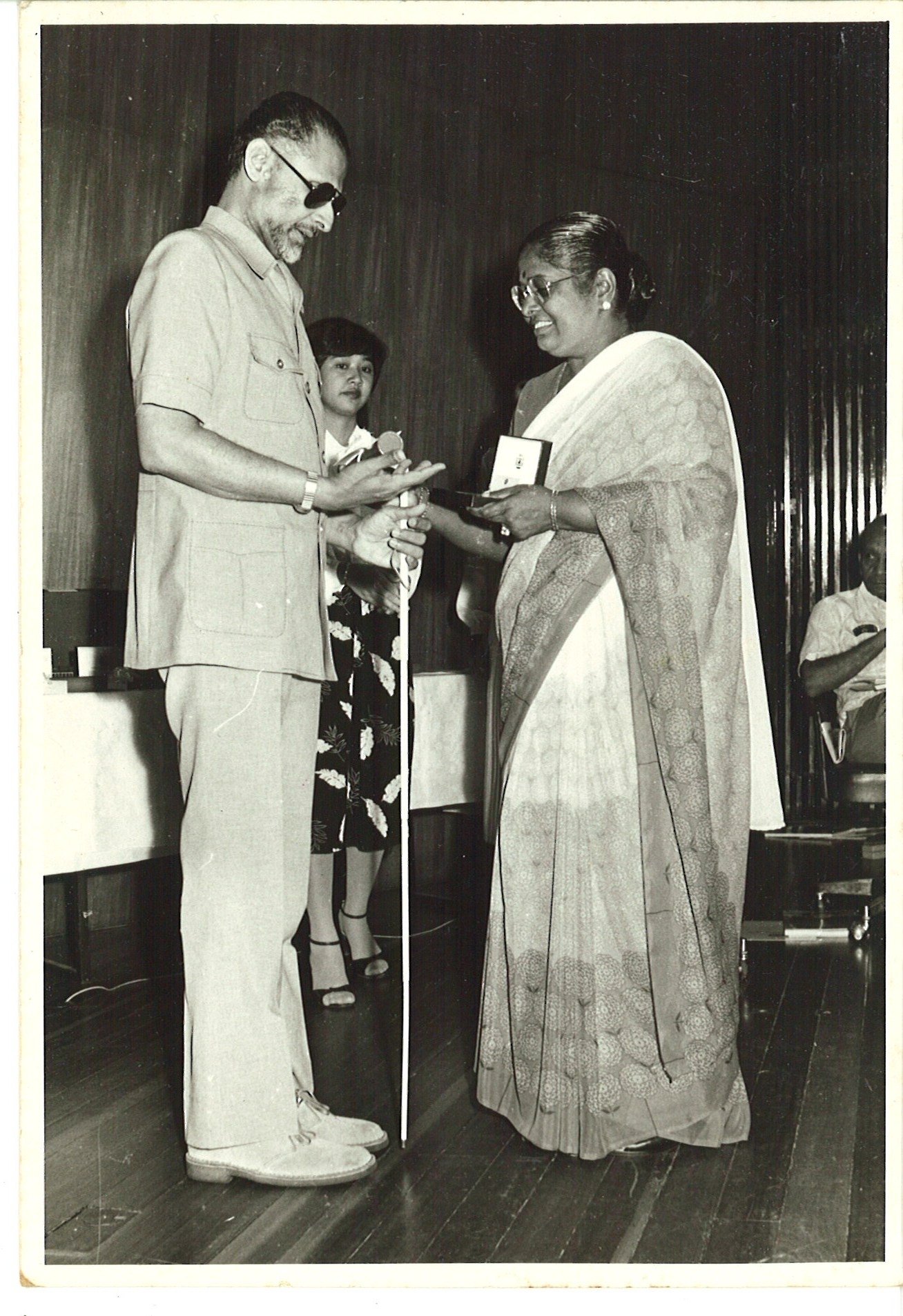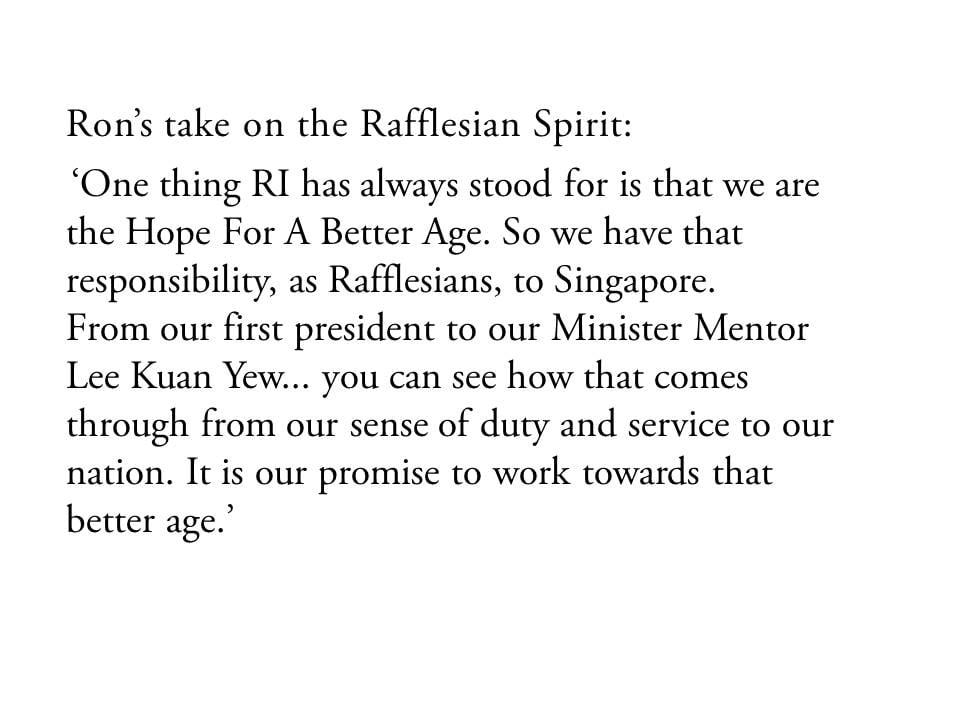Ron Chandran-Dudley attended RI from 1947 to 1951 and was well on his way to a promising future when a freak rugby accident cost him his eyesight - and changed the path his life would take.
***
‘‘The first test I ever sat for at Raffles was for literature ... and I got five marks,’’ Ron, who is now 77 years old, recounts.
‘I was one of the youngest to enter the school at that time at the age of 11 [the rest of the students were significantly older because of the war] and I had no idea how to answer the questions, or even what literature was. So I spent all my time answering just this one question. I think I must have written the entire book out!’ he laughs.
But that was in no way a sign of things to come, as Ron went on to achieve an outstanding academic performance at RI, so much so that in his final year, Ron and another classmate, Lim Kuang Hui, were selected to represent RI in the Festival of Britain essay-writing competition.
.jpg?sfvrsn=7d739dd7_0)
Ron (centre) with his fellow essayist, Lim Kuang Hui, at a prize-giving ceremony with the Miss Festival of Britain, 19-year-old Judy Breen.
Held in 1951, the Festival of Britain was a national exhibition celebrated throughout Britain and its colonies in an attempt to raise the empire out of its post-war doldrums.
In Singapore, the five-month-long festivities included the essay-writing competition which RI carried for two months running, thanks to the boys’ efforts. Ron also won the overall first prize for the competition.
All in all, 1951 was shaping up to be a good year. Ron was wicket-keeper for RI’s first team in cricket, and he was playing at right back for the hockey team. His dreams to become a brain surgeon were also coming true, thanks to an offer to study medicine in England the following year.
Life Changes
However, fate had other plans for him. The same year, he was accidentally kicked in the head while playing rugby and ended up in hospital for vision-related problems.
It was during those first few months in hospital that he first developed his keen sense of social justice, when he noticed how third-class patients were treated in comparison to first-class patients. He saw how patients would have to provide a bribe to the person manning the admissions desk in order to see the doctor. Those who could not afford the bribes were kept waiting for treatment while rich towkays would just walk in and be attended to by a retinue of doctors and nurses.
The next year saw Ron travelling all over the world, from the UK to Ceylon, seeking treatment for his deteriorating eyesight.
It was during one of these trips to the eye hospital in Vellore, South India that the doctor invited Ron to a medical presentation. Without much ado, he announced that Ron was going blind for good and asked the medical students gathered there, ‘So what do you think, fellows? Is this the end of the road for Dudley here?’
‘As one, the students responded no, I could still have a life serving others,’ Ron recalls. ‘But I thought to myself, if I’m going to serve anyone, it’s going to be Singaporeans first.’
Singaporeans First
He returned to Singapore in 1953, went to the Singapore Association for the Blind (now known as the Singapore Association of the Visually Handicapped) and volunteered his help.
Despite the Association’s amazement - he was the first blind person to offer help - he was assigned the superficial task of collecting and distributing clothes, food and toys to the visuallyhandicapped in Singapore.
The poverty and helplessness he encountered amongst the blind frequently left him depressed and frustrated.
Spurred by their plight, he thought to himself, ‘Why can’t we give the blind back their dignity? Why can’t we train them to do something useful so that they can give up begging and learn to be independent?’
He forced himself to come to terms with his blindness and resolved to educate the community to accept the disabled as functional members of society.
In 1959, he left Singapore again to study social anthropology at the London School of Economics (LSE). It was during his time there that Ron met and married his wife, Rena, a London-born dental nurse.
The Blind Leading the Blind
Upon his graduation, the happy couple returned to Singapore where Ron, barely 30, was appointed General Secretary for the Singapore Association for the Blind.
Up till then, the association had always been run by sighted people who, despite their good intentions, did not understand the needs of the blind. They administered the association as charity givers and did little to empower the blind.
Ron turned that on its head, starting with instituting policies that required at least half of the association’s executive committee to be made up of the visually handicapped.
He also initiated the Open Education System for the blind. Pioneered in 1967, the system enabled visually handicapped students to study in a mainstream school.
In 1969, he left the association to study vocational rehabilitation counselling and psychotherapy as a Fulbright Scholar at the State University of New York at Albany.
In 1971, he returned to Singapore and over the next decade, branched out into other areas of social service. He counselled drug abusers and trained after-care officers for the Singapore Anti-Narcotics Association. He was vice president and volunteer counsellor at the Singapore Association of Mental Health.
Eventually, he was elected president of the Singapore Association of the Visually Handicapped.

Ron receiving the ‘Friend of Labour’ May Day award in 1981, from then First Lady Mrs Devan Nair. The award recognised his contributions to social work.
Going Global
One of Ron’s crowning achievements, he feels, was the founding of the Disabled People’s International (DPI) in 1981. The DPI came about when Ron and 13 other disabled delegates at the 1980 Rehabilitation International World Conference in Canada felt that they were not getting their voice heard.
They decided to address this by founding the DPI, an organisation geared towards changing negative attitudes and policies that affect the world’s disabled. Ron was also elected the first chairperson of this newly-minted international organisation.
Through it, he saw himself one step closer towards achieving his dream of bringing dignity to the disabled through education and training.
Today, the DPI has national assemblies in over 110 countries worldwide and collaborates with international agencies such as UNESCO to further disability rights.
A Tireless Toil
Now in his 70s, Ron remains active and passionate about serving the disabled. He has received numerous awards both locally and abroad for his advocacy, including the Pingat Bakti Masyarakat (Public Service Medal) in 2001.
He has also received a testimonial signed by the UN Secretary General in 1987, in recognition of his dedicated service in support of the UN World Programme of Action concerning disabled persons. In 2010, ChannelNewsAsia ran a feature on him as one of their Asians of the Year. He is also a published author of plays and children's books.
When asked about the most important lesson from his life story, he says that his message is simple: that people with disabilities are handicapped only by their environment. And no, the journey towards fully integrating the handicapped into society is not yet over.
